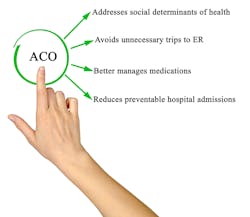CMMI Accepts 110 Participants in ACO REACH Model
The Center for Medicare and Medicaid Innovation has named the 110 participants provisionally accepted to participate in the ACO REACH model starting next year. CMMI accepted fewer than 50 percent of applicants, and 18 organizations withdrew their applications after receiving provisional acceptance.
CMMI noted that the provisionally accepted ACOs still must meet several conditions to participate, including confirmation that all governing body requirements are met and the ACOs must meet the minimum number of aligned beneficiaries.
The ACO REACH model, which is an evolution of the Direct Contracting model, tests how providers can be incentivized to collaborate across multiple treatment plans, spend more time with patients with complex, chronic conditions and ultimately, improve patient health outcomes. CMS said it expects patients will be empowered to engage in their healthcare with support from organizations that help them to navigate the complex healthcare system.
The first performance year of the ACO REACH Model will start on Jan. 1, 2023, and will run through 2026. CMS said it is not planning any other application opportunities for the model.
Some examples of what current participants in the Direct Contracting model offer Medicare patients:
• Efforts to improve diabetes control. A physician-owned and physician-directed organization that was established during the COVID-19 pandemic serves a diverse, complex patient base in a large urban area. In less than a year, this organization reported the number of Medicare beneficiaries with good diabetes control (based on A1c levels) has increased from 55 percent to 73 percent.
• Preventive, dental, and behavioral health care for underserved patients. An organization partnering with Federally Qualified Health Centers furnished preventive health services, dental services and behavioral health to underserved patients in rural communities of Massachusetts and Georgia.
• Access to care in the home. An organization in a southwest state offers its patients several enhanced services concurrent with other Medicare services using the flexibilities offered under this model including: primary care home visits for home-bound patients, palliative care, nutrition counseling, and pain management.
• Team-based care to meet patient needs. An organization’s care management team helps bridge care gaps between primary, specialty and emergency care that could result in hospital readmission. By identifying these gaps and coordinating additional medical and community resources to address patient care needs, patients are able to remain at home during recovery.
• Social needs and community-building. To address social isolation that has affected Medicare beneficiaries during the COVID-19 pandemic, one organization has a community room in its clinics that offers free yoga classes, monthly birthday parties, holiday celebrations, and “tell my story” days.
• Pharmacy coordination / medication management. An organization’s multi-disciplinary team incorporates a pharmacist and offers medication management support to help patients keep track of their medication(s), a frequent source of confusion, and identify any contra-indicated prescriptions, which can result when care is not coordinated across specialists.
Some of the organizations that have been provisionally accepted have started announcing their acceptance and sharing some details about what their approach will be. For instance, Great Lakes Integrated Network (GLIN), a clinically integrated network, said it will provide coordinated care to Medicare beneficiaries in Western New York.
GLIN has partnered with national population health management and value-based care tech enablement firm Cope Health Solutions to promote a successful transition to value-based care across GLIN's payer partners for all lines of business.
“As an ACO REACH entity, providers can now participate in the latest CMS value-based payment model directly through GLIN,” said Edina Vukic, interim executive director and COO of GLIN, in a statement. “The ACO REACH Model promotes provider leadership and governance, allowing our providers to work together and take responsibility for the quality of care and the overall costs of that care for Medicare beneficiaries, as well as people covered under Medicare Advantage, Medicaid, and commercial insurance. GLIN’s team-based approach and clinical integration will enable us to provide the best care at a lower cost.”
Philadelphia-based Belong Health, a company dedicated to advancing patient-centered healthcare and reducing the cost of caring for underserved and complex populations, also has been approved for ACO REACH participation.
Belong Health was initially formed in 2021 to partner with providers and regional dual-eligible special needs plans (D-SNPs) under the Medicare Advantage program. The company is now leveraging that experience to serve Medicare fee-for-service beneficiaries. Belong Health supplements existing care infrastructure with virtual and community-based resources to care for every member – even those that are historically hard to reach. The team includes operators, clinicians, registered nurses, licensed clinical social workers, and community health workers with extensive experience serving high-needs populations.
“Too many people from historically underserved communities do not receive the quality of care they should expect,” said Belong Health CEO J. Patrick Foley, in a statement. “As an ACO REACH participant, we understand the importance of partnering with local providers to serve these populations through innovative, individualized support.”


